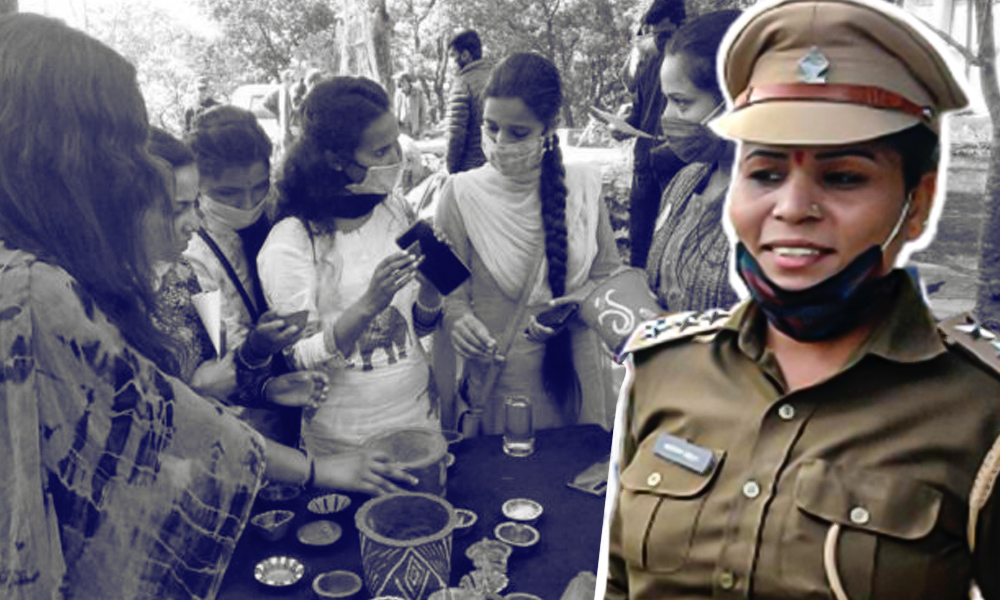
Image Credits: PradeshNews24*7, Facebook/Mussoorie Wildlife Sanctuary
'Vocal For Local': This Uttarakhand Forest Officer Is Helping Locals Use Cow Dung To Make Sustainable Products
Writer: Palak Agrawal
Palak a journalism graduate believes in simplifying the complicated and writing about the extraordinary lives of ordinary people. She calls herself a " hodophile" or in layman words- a person who loves to travel.
Uttarakhand, 16 March 2021 5:34 AM GMT
Editor : Navya Singh |
Navya writes and speaks about matters that often do not come out or doesn’t see daylight. Defense and economy of the country is of special interest to her and a lot of her content revolves around that.
Creatives : Rajath
A free spirit who find meaning in life with the virtue of creativity and doing job par its excellence, animal lover and traveller by heart.
Medhavi Keerti, supervising and managing the Bhadrigaad range, is uplifting the lives of villagers particularly women by helping them manufacture and market diyas, pots and incense sticks using cow dung.
A Forest Range Officer in Uttarakhand is taking the call of 'Atmanirbhar Bharat' and 'Vocal For Local' to grassroots levels. Medhavi Keerti, supervising and managing the Bhadrigaad range, is uplifting the lives of the villagers particularly women by helping them manufacture and market home-made products.
Fondly called 'Ranger Didi', Keerti has been instrumental in coming up with a first-of-its-kind program —the Dhatree initiative to train women in a variety of occupation and help them earn a dignified living. To arrange for the necessary resources regarding the initiative, she utilised the catchment area treatment funds of the Uttarakhand State Forest Department.
Keerti joined the posting last year and had been trying to find ways to make the village self-sufficient as well as to conserve nature. Eventually, she came up with an idea to make use of the waste to create sustainable products. Within a short period, she helped the locals to manufacture and market several items including diyas, havan products and pots.
"It was difficult convincing people. But with the support of my seniors, especially DFO Kehkashan Naseem Ma'am, I succeeded. Finally, it all started last year barely a month before Diwali. We arranged machines and trainers to train a few local women," she told The New Indian Express.
"Locals in this range domesticated farm animals and cow dung, the waste product was found in abundance, that could have been put to better use. It was being used as manure but we could use it for other purposes before the last resort. Hence, we started the initiative barely a month before Diwali. From procuring the machines to training the women in the production process, everything was completed in a short span of time," the Range Officer told in a video interview with Sameer Shukl.
"The diyas and the pots are being created in an eco-friendly manner, without the use of any chemicals. After multiple uses, they can be used as fertilizer for the farms. The earnings during this month were around ₹40,000 which was not a small sum. It resulted in motivating and encouraging the villagers to take up the efforts on a large scale.
Marketing sessions were also conducted to empower the people in handling the process end-to-end. The products are being sent to a number of places for sale such as Mussorie and Dehradun. Dhatree has become successful because of the collaboration of the locals and the Forest Department," Keerti explained.
"We wanted people to think this initiative as setting up a small scale business which should be able to sustain itself even without the involvement of the officers. Therefore, we started manufacturing incense sticks and dhoop sticks under a separate brand 'Nandini'. A group of six young girls was created and roped in to experiment with a variety of such products. Under Nandini, unmarried girls work and manufacture their own products made from environment-friendly ingredients and are affordable," she added.
Keerti has also arranged training courses for local women in food processing, knitting and stitching. The officer said that villagers from Bhut Gaon (cow dung products), Negyana (aroma and cosmetics products made from indigenous medicinal plants), Bandasari (local food grains and food processing), Tikri (knitting and stitching), Sumankyari (Vedik Patravali from Malu and Timli plants) districts are leading the way.
Kehkashan Naseem, Divisional Forest Officer of the Mussoorie was all praise for the officer's hard work for coming with the initiative and ensuring the execution.
"Medhavi Keerti has put in a lot of hard work. We hope to build 'Dhatree' as a renowned brand for good quality, indigenous products," Naseem said.
"Earlier we sold our 'Manduwa' for Rs 35 per kg. It is now sold at Rs 140 a kg. I earn 10 times more than I used to about a year ago. I make items from cow dung, cultivate and sell food grains at better prices, make juices as well as market our spices too," said 46-year-old Nirmala Panwar, one of the beneficiaries.
Also Read: Orphaned, Married At Young Age, Rajasthan Woman Educates Self To Teach Tribals
 All section
All section














